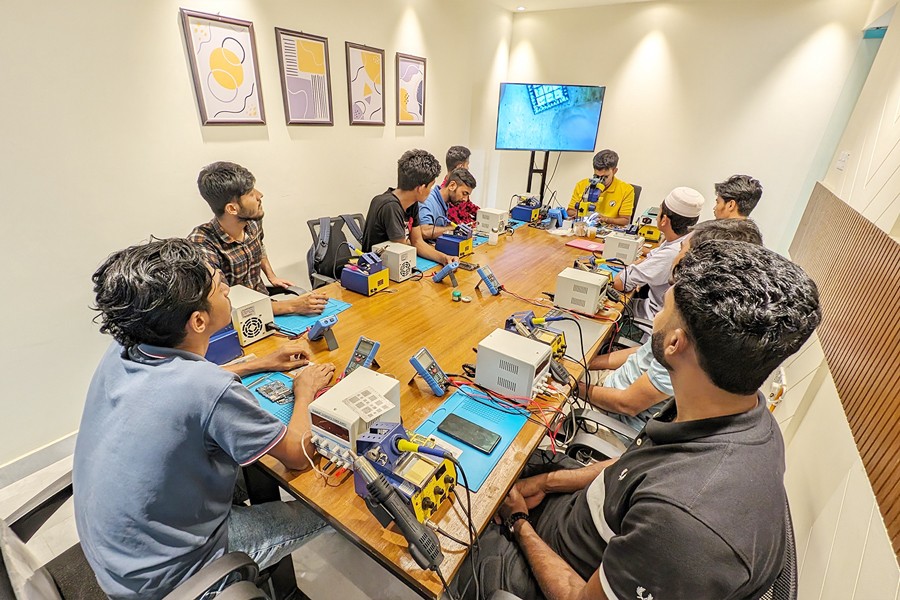

Developing skills is not just about addressing immediate job market needs, both domestic and international; it is also about fostering an efficient human resource base that can contribute to the economy in diverse ways. Skill development, therefore, is a holistic endeavour. It involves equipping youth and the wider population with competencies across various sectors. For the educated, this means fostering higher skills, while for the less educated, it entails hands-on skill development tailored to their needs.
The key challenge is creating a national culture that prioritises skill nurturing and development. Transforming humans into valuable resources requires consistent and comprehensive planning, as there is no shortcut to skill development. Fragmented or poorly planned efforts yield limited results, as evidenced by numerous development programmes and industrial productivity initiatives that suffer due to a lack of skilled manpower. Unfortunately, there has been little systematic evaluation of the outcomes of public and private sector skill development programmes, leaving significant skill gaps unaddressed.
Deficiencies in skilled human resources have far-reaching consequences. Domestically, many industries rely heavily on foreign expertise to fill skill gaps. For instance, Bangladesh’s garment sector alone employs thousands of expatriates to manage daily operations, costing the country approximately $4.0 billion annually. These roles often do not require advanced technical skills but rather a sound understanding of machineries and equipment-skills that could be cultivated locally.
Internationally, the export of unskilled Bangladeshi workers limits their earning potential. Most are employed in low-wage sectors, earning minimal salaries due to a lack of specialised skills. This also deprives them of additional benefits such as job security and health insurance. By contrast, skilled workers could command higher wages, better job conditions, and long-term benefits, contributing more significantly to the country’s economy.
The need for skilled manpower is indisputable, both at home and abroad. However, the focus must be on sector-specific needs. This calls for vocational training to be an integral part of government policy. Unfortunately, vocational education in Bangladesh has suffered due to a misaligned and underfunded education system. To address this, advocacy programmes should encourage more youths to enrol in vocational institutes where their learning can translate into tangible job opportunities or entrepreneurial ventures.
Equally important is the evaluation and improvement of existing vocational and technical training institutions. Many of these facilities lack the resources-both technological and human-to effectively provide skill-building programmes. A comprehensive review of their capacities is necessary to ensure that they are equipped to meet the country’s current and future needs.
Bangladesh has a significant demographic advantage. Around 76 per cent of its population is within the working-age bracket, and approximately 2.1 million individuals join the workforce each year. This demographic dividend offers a unique opportunity to develop a large pool of skilled workers who can drive the domestic economy and meet global labour demands. However, without targeted investments in education and skill development, this advantage could become a liability.
Investment in education for skill development is critical. For university students, skill development must become a core part of the academic curriculum. Unfortunately, most public universities in Bangladesh, and even many private institutions, lack the funds to support basic research, let alone skill-oriented programmes. Bridging this gap requires government intervention to allocate resources and ensure that skill development is prioritised in higher education.
The government bears the primary responsibility for addressing structural and organisational deficiencies in the country’s skill development framework. A strategic and progressive approach is essential to identify and address skill gaps across various sectors; standardise and improve the quality of vocational and technical education; ensure sufficient investment in training infrastructure and resources; foster collaboration between industry and educational institutions to align training with market needs. By adopting these measures, the government can create a skilled workforce capable of sustaining Bangladesh’s economic growth and enhancing its global competitiveness.
Low wages have long been a cornerstone of Bangladesh’s economic competitiveness. However, as global markets evolve, this advantage is no longer sustainable. To remain competitive, Bangladesh must transition from a low wage-driven model to one based on innovation and skills. This requires a coordinated effort to develop a national culture of skill enhancement, backed by strategic investments in education and training. By leveraging its demographic dividend and addressing existing gaps, Bangladesh can secure a more prosperous and sustainable future.
[email protected]

